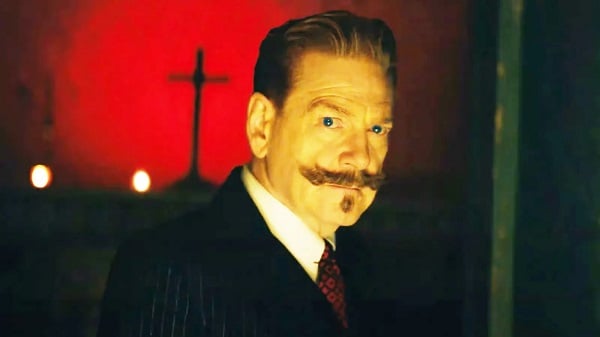Our producer-at-large Father Vince Kuna, C.S.C., a 2016 USC film-school grad, does a regular feature here called BASED ON, looking at literary works adapted into TV or movies.
A Haunting in Venice, directed by Kenneth Branagh, based on Agatha Christie’s Hallowe’en Party
When adapting Agatha Christie novels, there’s an old suggestion that a filmmaker should never try to “Out-Christie Christie.”
Supersleuth writer Agatha Christie already prepped the structure, twists, plots, conspiracies, and the like. No one said anything about mixing genres and upping the supernatural elements, however.
In A Haunting in Venice -- released on Christie's birthday, Sept. 15 -- director and star Kenneth Branagh deftly appropriates the horror flick into the classic detective procedural. The effect leaves the viewer in greater suspense.
As engaging as both Christie's novels and Branagh’s previous adaptations (Murder on the Orient Express; Death on the Nile) are, I was always reassured Belgian detective Hercule Poirot would eventually finger the culprit or cabal of culprits.
In this post-WWII Venetian reimagining of the story, I honestly thought the case could end ambiguously.
Ghosts, a Séance and the Question of the Soul's Existence Beyond Death
I will only reveal the premise of the film. Local gendarmes find a drowned woman in a canal in Venice. Did she jump from the roof, tormented by some supernatural force, or was she murdered by one of the characters?
Will Poirot (Branagh) rely solely upon his reason, or will he also welcome aid from a dead soul?
The film begins with Poirot resigned to an early retirement, having lost his faith in God, weary from world wars, endless murder investigations and human indifference.
That this story incorporates a possible notion of the life beyond, we truly sense the newly agnostic Poirot is, for the first time, in over his head. The stakes, as they are for any Christie story, are high: the lives of characters.
By introducing the supernatural, Branagh raises these stakes to the highest … the balance of their souls.
If You've Seen the Movie, You Haven't Experienced the Book
The film departs substantially from Agatha Christie’s whodunit, Hallowe’en Party, so much so, that the seemingly only remaining connective tissue is that both stories take place on Halloween.
Christie situates her story in the waning months of 1969 England, stripping it of the supernatural elements surrounding Branagh’s adaptation. That is not to say that the novel doesn’t address faith and morality.
After a Halloween party, the host of the party finds an adolescent girl drowned in a metal tub, the victim of an apple-bobbing contest gone horribly wrong. Beyond the page-turning mystery expected of master-plotter Christie, I found this novel a meditation on crime and the decline of British culture.
From Post-WWII Ennui to Late-1960s Nihilism
Poirot acquires the various facts of the case through his typical interrogation, yet characters can’t help but providing their own political commentary: breakdown of the family, shuttering of mental institutions, and the drift from Christianity (Christie was a devout Anglican), are to blame for this forced drowning.
Poirot doesn’t necessarily disagree with the villagers’ assessments, but their prattling doesn’t aid the investigation, either. Society can’t be put on trial, but an individual can be. He sets about meticulously finding the murderer, stating the adage “old sins cast long shadows.”
In the opening chapter, a character laments to another the English no longer retain the cultural practices of the French, who lovingly place flowers over the graves of departed loved ones on All Souls’ Day.
The English partygoers instead revel in the American export of Halloween.
It’s from that point of divergence that the novel’s troubles begin. The characters, in eschewing culture and faith of a previous era, endure the vapid quality of the current one.
The movie questions whether the essence of a person can survive death, while the book wonders if the essence of a culture can survive its own members. The stories, while differing in approaches (Christie’s secular novel, and Branagh’s overtly Catholic-themed film), nevertheless highlight the importance of faith for both society and the individual.
Image: Kenneth Branagh as Hercule Poirot in 'A Haunting in Venice'/Photo: 20th Century Studios
Click here to visit Father Vince Kuna’s IMDB page.
Keep up with Family Theater Productions on our website, Facebook, Twitter and YouTube.
